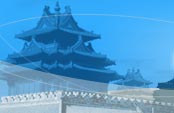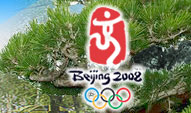A set of five doll mascots -- Fuwa, for the 2008 Olympic Games were unveiled in Beijing on November 11, exactly 1,000 days before the event's opening ceremony. The long-anticipated mascots, which embody the natural characteristics of four of China's popular animals -- the Fish (L), the Panda (2nd, L), the Tibetan Antelope (2nd, R), the Swallow (R)-- and the Olympic Flame (C), were presented at a grand ceremony inside the Workers' Gymnasium in Beijing.
The Official Mascots of the Beijing 2008 Olympic Games
Like the Five Olympic Rings from which they draw their color and inspiration, the five Fuwa will serve as the Official Mascots of Beijing 2008 Olympic Games, carrying a message of friendship and peace--and blessings from China--to children all over the world.
Designed to express the playful qualities of five little children who form an intimate circle of friends, the five Fuwa also embody the natural characteristics of four of China's most popular animals--the Fish, the Panda, the Tibetan Antelope, the Swallow--and the Olympic Flame.
In China's traditional culture and art, the fish and water designs are symbols of prosperity and harvest. And so Beibei carries the blessing of prosperity. A fish is also a symbol of surplus in Chinese culture, another measure of a good year and a good life. The ornamental lines of the water-wave designs are taken from well-known Chinese paintings of the past. Among the five Fuwa, Beibei is known to be gentle and pure. Strong in water sports, she reflects the blue Olympic ring.
Each of the Fuwa has a rhyming two-syllable name -- a traditional way of expressing affection for children in China. Beibei is the Fish, Jingjing is the Panda, Huanhuan is the Olympic Flame, Yingying is the Tibetan Antelope and Nini is the Swallow.
When you put their names together -- Bei Jing Huan Ying Ni--they say "Welcome to Beijing," offering a warm invitation that reflects the mission of the five Fuwa as young ambassadors for the Olympic Games.
The five Fuwa also embody both the landscape and the dreams and aspirations of people from every part of the vast country of China. In their origins and their headpieces, you can see the five elements of nature--the sea, forest, fire, earth and sky--all stylistic rendered in ways that represent the deep traditional influences of Chinese folk art and ornamentation.
Spreading Traditional Chinese Blessings Wherever They Go
In the ancient culture of China, there is a grand tradition of spreading blessings through signs and symbols. Each of the five Fuwa symbolizes a different blessing --and will honor this tradition by carrying their blessings to the children of the world. Prosperity, happiness, passion, health and good luck will be spread to every continent as the five Fuwa carry their invitation to Beijing 2008 to every part of the globe.
At the heart of their mission -- and through all of their work -- the five Fuwa will seek to unite the world in peace and friendship through the Olympic spirit. Dedicated to helping Beijing 2008 spread its theme of One World, One Dream to every continent, the five Fuwa reflect the deep desire of the Chinese people to reach out to the world in friendship through the Games -- and to invite every man, woman and child to take part in the great celebration of human solidarity that China will host in the light of the flame in 2008.
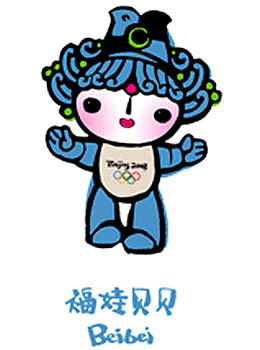
In China's traditional culture and art, the fish and water designs are symbols of prosperity and harvest. And so Beibei carries the blessing of prosperity. A fish is also a symbol of surplus in Chinese culture, another measure of a good year and a good life.
The ornamental lines of the water-wave designs are taken from well-known Chinese paintings of the past. Among the five Fuwa, Beibei is known to be gentle and pure. Strong in water sports, she reflects the blue Olympic ring.
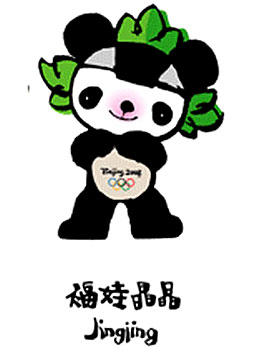
Jingjing makes children smile -- and that's why he brings the blessing of happiness wherever he goes. You can see his joy in the charming naivety of his dancing pose and the lovely wave of his black and white fur. As a national treasure and a protected species, pandas are adored by people everywhere. The lotus designs in Jingjing's headdress, which are inspired by the porcelain paintings of the Song Dynasty (A.D.960-1234), symbolize the lush forest and the harmonious relationship between man and nature. Jingjing was chosen to represent our desire to protect nature's gifts--and to preserve the beauty of nature for all generations. Jingjing is charmingly naive and optimistic. He is an athlete noted for strength who represents the black Olympic ring.
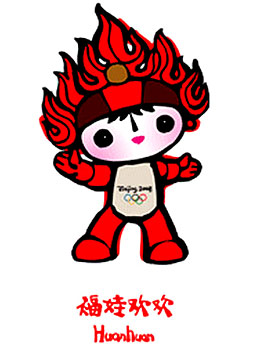
In the intimate circle of Fuwa, Huanhuan is the big brother. He is a child of fire, symbolizing the Olympic Flame and the passion of sport -- and passion is the blessing he bestows. Huanhuan stands in the center of Fuwa as the core embodiment of the Olympic spirit. And while he inspires all with the passion to run faster, jump higher and be stronger, he is also open and inviting. Wherever the light of Huanhuan shines, the inviting warmth of Beijing 2008 -- and the wishful blessings of the Chinese people -- can be felt. The firery designs of his head ornament are drawn from the famed Dunhuang murals -- with just a touch of China's traditional lucky designs. Huanhuan is outgoing and enthusiastic. He excels at all the ball games and represents the red Olympic ring.
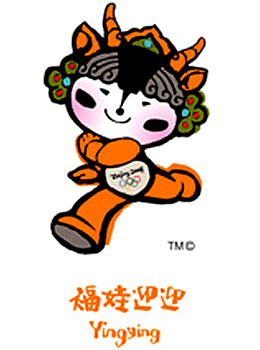
Like all antelopes, Yingying is fast and agile and can swiftly cover great stretches of land as he races across the earth. A symbol of the vastness of China's landscape, the antelope carries the blessing of health, the strength of body that comes from harmony with nature. Yingying's flying pose captures the essence of a species unique to the Qinghai-Tibet Plateau, one of the first animals put under protection in China. The selection of the Tibetan Antelope reflects Beijing commitment to a Green Olympics. His head ornament incorporates several decorative styles from the Qinghai-Tibet and Sinkiang cultures and the ethnic design traditions of Western China. Strong in track and field events, Yingying is a quick-witted and agile boy who represents the yellow Olympic ring.
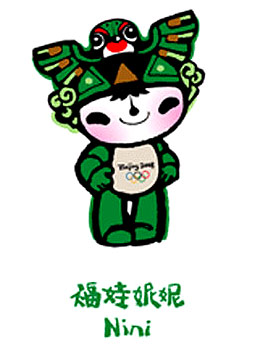
Every spring and summer, the children of Beijing have flown beautiful kites on the currents of wind that blow through the capital. Among the kite designs, the golden-winged swallow is traditionally one of the most popular. Nini's figure is drawn from this grand tradition of flying designs. Her golden wings symbolize the infinite sky and spread good-luck as a blessing wherever she flies. Swallow is also pronounced "yan" in Chinese, and Yanjing is what Beijing was called as an ancient capital city. Among the five Fuwa, Nini is as innocent and joyful as a swallow. She is strong in gymnastics and represents the green Olympic ring.
(http://en.beijing2008.com, Xinhua News Agency November 11, 2005)
